Jaye 2015年暑期补习 知识点2 -- 从句
名词性从句课堂笔记完整整理
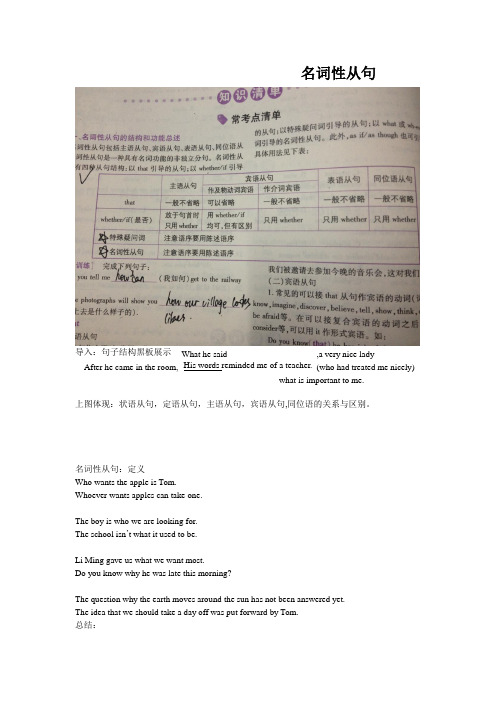
名词性从句导入:句子结构黑板展示 His words reminded me of a teacher.上图体现:状语从句,定语从句,主语从句,宾语从句,同位语的关系与区别。
名词性从句:定义Who wants the apple is Tom.Whoever wants apples can take one.The boy is who we are looking for.The school isn ’t what it used to be.Li Ming gave us what we want most.Do you know why he was late this morning?The question why the earth moves around the sun has not been answered yet.The idea that we should take a day off was put forward by Tom.总结:After he came in the room, (who had treated me nicely)What he said what is important to me.,a very nice lady连接词:that 不做成分,没有意思Whether/if 不做成分,有意思“是否”What/who/which/whom/ whose /whatever/whoever/ whichever/whomever/做成分,(主语,宾语,表语,定语);有意思When/why/where/how/whenever/however/wherever做成分(状语),有意思从句的语序:I don’t understand why he cried suddenly?练习:划结构,判断从句What he said is not true.I don’t know where we should go.Do you know that he has gone to university?Word came that our class had won the games.He doubts whether he will come back tomorrow.I was very satisfied with what you had done yesterday.I can’t imagine how he did it.It looks as if he is ill.Whether he will come back today is not sure.Where he went remains a mystery.That he broke the cup made his mother very angry.The problem is where we should stay.The story is that a girl was abused by his step father.Have you heard the news that five children were killed at the school yesterday?主语从句:概念:在主从复合句中,充当主语的从句,叫主语从句。
专题2 知识梳理-必背句型-七年级英语下期末备考冲刺满分专题(人教版)

2021-2022年七年级下期期末冲刺满分(人教版)知识梳理-必背句型Unit 1 Can you play the guitar?1.-Can you play the guitar or the violin? 你会弹吉他还是拉小提琴?-I can play the guitar.我会弹吉他。
2.-Can you play the guitar and the violin? 你会吉他和拉小提琴吗?-Yes,I can./No.I can't. 是的,我会。
/不,我不会。
3.-What can he do? 他会干什么?-He can play chess. 他会下国际象棋。
4.-What club do you want to join? 你想参加什么俱乐部?-I want to join the swimming club. 我想参加游泳俱乐部。
5.Bill can tell stories, but he can't write stories. 比尔会讲故事,但是他不会写故事。
6.You are very good at telling stories. 你非常善于讲故事。
(That)Sounds good! (那)听起来好极了!7.We can sing English songs well. 我们可以把英文歌唱得很好。
8.I can speak English and I can also play soccer. 我会说英语,我也会踢足球。
9.Lisa wants to join the music club, but she can't play the guitar. 莉萨想加入音乐俱乐部,但她不会弹吉他。
10. I am in the school music club. 我在学校音乐俱乐部。
e and show us! 来展示给我们看吧!12.We are good with old people. 我们跟老人相处得很好。
背+考模式 2015版新目标七年英语下Unit 2知识点详解
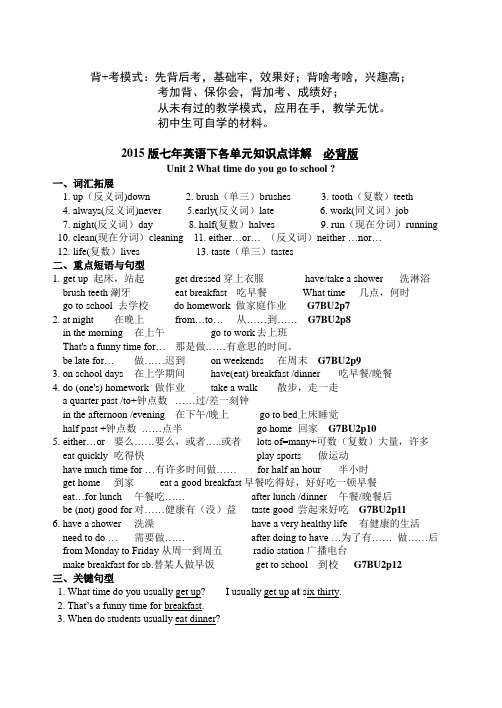
背+考模式:先背后考,基础牢,效果好;背啥考啥,兴趣高;考加背、保你会,背加考、成绩好;从未有过的教学模式,应用在手,教学无忧。
初中生可自学的材料。
2015版七年英语下各单元知识点详解必背版Unit 2 What time do you go to school ?一、词汇拓展1. up(反义词)down2. brush(单三)brushes3. tooth(复数)teeth4. always(反义词)never5.early(反义词)late6. work(同义词)job7. night(反义词)day 8. half(复数)halves 9. run(现在分词)running 10. clean(现在分词)cleaning 11. either…or… (反义词)neither …nor…12. life(复数)lives 13. taste(单三)tastes二、重点短语与句型1.get up 起床,站起get dressed穿上衣服have/take a shower 洗淋浴brush teeth涮牙eat breakfast 吃早餐What time 几点,何时go to school 去学校do homework 做家庭作业G7BU2p72. at night 在晚上from…to…从……到……G7BU2p8in the morning 在上午go to work 去上班That's a fun ny time for…那是做……有意思的时间。
be late for…做……迟到on weekends 在周末G7BU2p93. on school days 在上学期间have(eat) breakfast /dinner 吃早餐/晚餐4. do (one's) homework 做作业take a walk 散步,走一走a quarter past /to+钟点数……过/差一刻钟in the afternoon /evening 在下午/晚上go to bed上床睡觉half past +钟点数……点半go home 回家G7BU2p105.either…or要么……要么,或者…..或者lots of=many+可数(复数)大量,许多eat quickly 吃得快play sports 做运动have much time for …有许多时间做…… for half an hour半小时get home 到家eat a good breakfast早餐吃得好,好好吃一顿早餐eat…for lunch午餐吃…… after lunch /dinner 午餐/晚餐后be (not) good for 对……健康有(没)益taste good 尝起来好吃G7BU2p116. have a shower 洗澡have a very healthy life 有健康的生活need to do …需要做…… after doing to have …为了有…… 做……后from Monday to Friday从周一到周五radio station广播电台make breakfast for sb.替某人做早饭get to school 到校G7BU2p12三、关键句型1. What time do you usually get up? I usually get up at six thirty.2. That’s a funny time for breakfast.3. When do students usually eat dinner?They usually eat dinner at a quarter to seven in the evening.4. In the evening, I either watch TV or play computer games.5. At twelve, she eats lots of fruit and vegetables for lunch..6. She knows it’s not good for her, but it tastes good.7. Here are your clothes.四、重点语法1、what time和when引导的特殊疑问句。
Jaye 句子类型 句子结构 句子成分
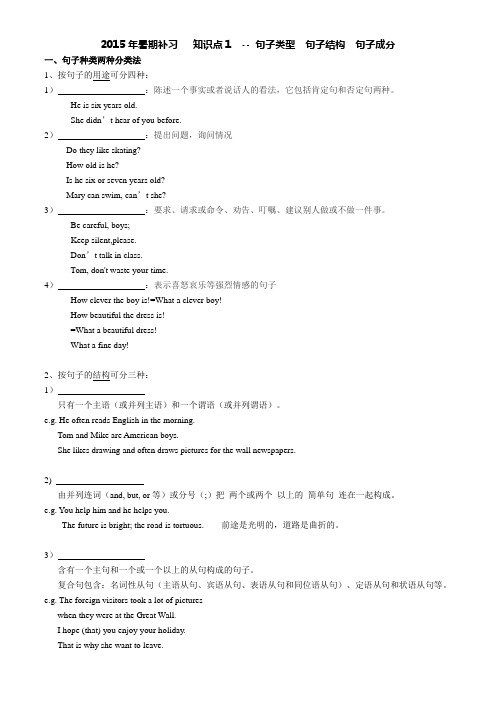
2015年暑期补习知识点1 -- 句子类型句子结构句子成分一、句子种类两种分类法1、按句子的用途可分四种:1):陈述一个事实或者说话人的看法,它包括肯定句和否定句两种。
He is six years old.She didn’t hear of you before.2):提出问题,询问情况Do they like skating?How old is he?Is he six or seven years old?Mary can swim, can’t she?3):要求、请求或命令、劝告、叮嘱、建议别人做或不做一件事。
Be careful, boys;Keep silent,please.Don’t talk in class.Tom, don't waste your time.4):表示喜怒哀乐等强烈情感的句子How clever the boy is!=What a clever boy!How beautiful the dress is!=What a beautiful dress!What a fine day!2、按句子的结构可分三种:1)只有一个主语(或并列主语)和一个谓语(或并列谓语)。
e.g. He often reads English in the morning.Tom and Mike are American boys.She likes drawing and often draws pictures for the wall newspapers.2)由并列连词(and, but, or等)或分号(;)把两个或两个以上的简单句连在一起构成。
e.g. You help him and he helps you.The future is bright; the road is tortuous. 前途是光明的,道路是曲折的。
3)含有一个主句和一个或一个以上的从句构成的句子。
高二英语选修四知识点归纳
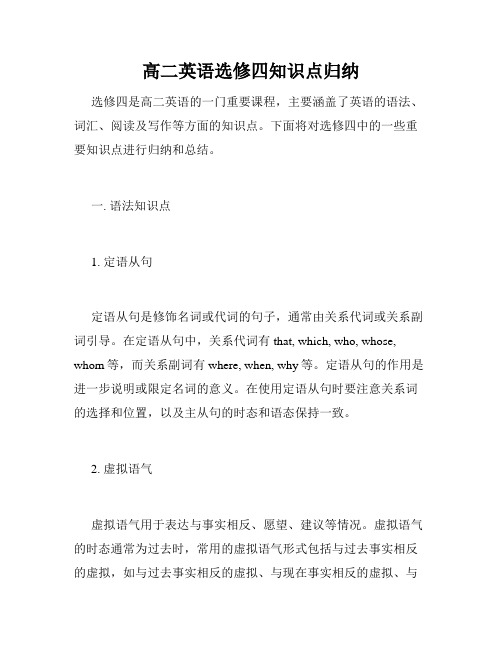
高二英语选修四知识点归纳选修四是高二英语的一门重要课程,主要涵盖了英语的语法、词汇、阅读及写作等方面的知识点。
下面将对选修四中的一些重要知识点进行归纳和总结。
一. 语法知识点1. 定语从句定语从句是修饰名词或代词的句子,通常由关系代词或关系副词引导。
在定语从句中,关系代词有that, which, who, whose, whom等,而关系副词有where, when, why等。
定语从句的作用是进一步说明或限定名词的意义。
在使用定语从句时要注意关系词的选择和位置,以及主从句的时态和语态保持一致。
2. 虚拟语气虚拟语气用于表达与事实相反、愿望、建议等情况。
虚拟语气的时态通常为过去时,常用的虚拟语气形式包括与过去事实相反的虚拟,如与过去事实相反的虚拟、与现在事实相反的虚拟、与将来事实相反的虚拟等。
在运用虚拟语气时,需注意条件从句和主句的相应时态。
二. 词汇知识点1. 同义词与近义词同义词是指义相同或相近的词语,如big和large,happy和glad。
而近义词指意义相近但不完全相同的词语,如house和home,begin和start。
掌握常见的同义词和近义词,可以提高阅读和写作的准确性和表达能力。
2. 词根、词缀和派生词词根是构成词汇的基本单位,它可以独立存在,也可以与其他词缀组合成新的词汇,如dict(说)和port(携带)。
词缀是附加在词根前后的字母或字母组合,可以改变词的词性或词义,如dis-(否定)、un-(不)、-ful(充满的)等。
派生词是由词根和词缀组成的新词,如dictionary(词典)和transportation(运输)。
三. 阅读理解知识点1. 主旨大意阅读理解中的主旨大意是指文章的中心思想或主要观点。
要准确抓住文章的主旨大意,需要综合考虑文章的标题、开头和结尾段落,以及重要信息点和关键词等。
在阅读理解中,找到主旨大意有助于更好地理解和答题。
2. 推理判断推理判断是根据文章所提供的信息,结合自己的常识和推理能力,进行逻辑推断和判断。
高二英语暑期作业 复习方法策略讲 第12讲 语从句的4个
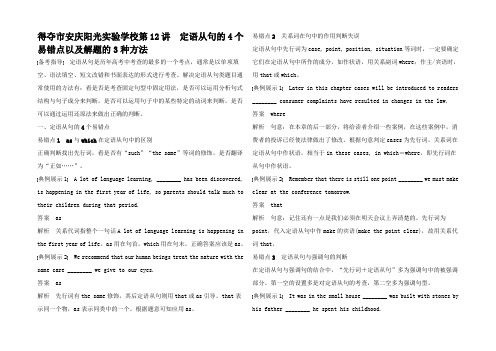
得夺市安庆阳光实验学校第12讲定语从句的4个易错点以及解题的3种方法备考指导定语从句是历年高考中考查的最多的一个考点,通常是以单项填空、语法填空、短文改错和书面表达的形式进行考查。
解决定语从句类题目通常使用的方法有:看是否是考查固定句型中固定用法,是否可以运用分析句式结构与句子成分来判断,是否可以运用句子中的某些特定的动词来判断,是否可以通过运用还原法来做出正确的判断。
一、定语从句的4个易错点易错点1as与which在定语从句中的区别正确判断找出先行词,看是否有“such”“the same”等词的修饰,是否翻译为“正如……”。
典例展示1 A lot of language learning, ________ has been discovered, is happening in the first year of life, so parents should talk much to their children during that period.答案as解析关系代词指整个一句话A lot of language learning is happening in the first year of life。
as用在句首,which用在句末,正确答案应该是as。
典例展示2We recommend that our human beings treat the nature with the same care ________ we give to our eyes.答案as解析先行词有the same修饰,其后定语从句则用that或as引导。
that表示同一个物,as表示同类中的一个。
根据题意可知应用as。
易错点2关系词在句中的作用判断失误定语从句中先行词为case, point, position, situation等词时,一定要确定它们在定语从句中所作的成分,如作状语,用关系副词where;作主/宾语时,用that或which。
L12条件状语从句的使用--新概念英语英语2讲义
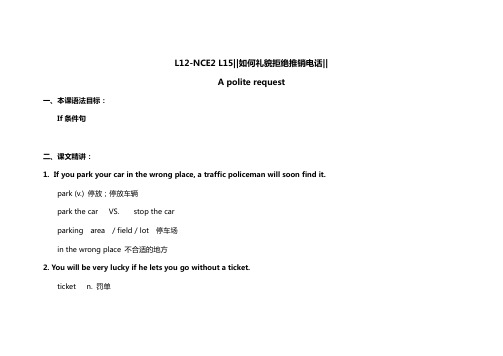
L12-NCE2 L15||如何礼貌拒绝推销电话||A polite request一、本课语法目标:If条件句二、课文精讲:1.If you park your car in the wrong place, a traffic policeman will soon find it.park (v.) 停放;停放车辆park the car VS. stop the carparking area / field / lot 停车场in the wrong place 不合适的地方2. You will be very lucky if he lets you go without a ticket.ticket n. 罚单let (sb) go 放开,使自由Let it go! 任它去,放下3.However, this does not always happen. Traffic police are sometimes very polite.(1)however,然而,表转折,用逗号与其它成分隔开I'd like to go with you; however, my hands are full.(2)polite (adj.) 有礼貌的,客气的impolite / rude (adj.) 无礼的,粗鲁的Manners maketh man. 不知礼,无以立也。
4.During a holiday in Sweden, I found this note on my car: …note (n.) 字条,便条a note of thanksIt's a custom to write a note of thanks to the hostess.take notes 做笔记5.'Sir, we welcome you to our city. This is a 'No Parking' area.(1)welcome (sb.) to + place 欢迎某人来到某地北京欢迎你! →Welcome to Beijing!(2)no+ doing,表示禁止做…No Smoking.No Swimming.6.'… You will enjoy your stay here if you pay attention to our street signs.'(1)pay attention to 注意;重视In doing our work, we must pay attention to ways and means.做工作应注意方式方法。
高三英语一轮复习语法专题:名词性从句)

12
解析 答案
2.What you can learn from the ant philosophy is: Never give up,look ahead,stay positive and do all you can.(2017·江西上饶模拟) 解析 分析句子结构可知,设空处引导主语从句,且从句中learn后缺 少宾语,故填What。
where his parents were missing.
解析 句意为:……他转过身发现父母不见了。由句意可知,宾语从 句句意完整且不缺少成分,所以应该用that引导从句或省略。
123
解析 答案
3.If you notice that when someone is missing or hurt,tell your teacher
(2)一般情况下,宾语从句中的引导词that可省略,但在以下几种情况中 that一般不省略:①当that从句和主句谓语动词之间有插入语时;②有多 个that引导的从句时,第一个that可以省略,而其他的that常不可省略; ③ 介 词 except , but , besides , in 等 后 跟 that 引 导 的 宾 语 从 句 时 ; ④ 当 when,who,what,where,why,how等引导的从句与that引导的从句 作主句谓语动词的并列宾语时。 He judged that,because he was a child,he did not understand wine. The reason lies in that she works harder than the others do. Everyone knew what happened and that she was worried.
从句知识点总结

从句知识点总结一、从句的概念。
从句是复合句中不能独立成句,但具有主语部分和谓语部分,由that、who、whom、when、why、where、how、which等引导词(Connective)引导的非主句部分。
它在整个句子中充当一个句子成分,如主语、宾语、表语、定语、状语等。
二、从句的分类。
1. 名词性从句。
- 主语从句。
- 定义:在复合句中充当主语的从句。
- 引导词:that(无意义,不充当成分,只起连接作用,但不可省略,在口语或非正式文体中that可省略的情况除外)、whether(是否)、if(是否,只能用于宾语从句,且不与or not连用)、连接代词(what、who、whom、which、whose等,在从句中充当主语、宾语、表语或定语)、连接副词(when、where、why、how等,在从句中充当状语)。
- 例如:That he will come to the party is certain.(that引导主语从句,位于句首时不能省略)- 注意:为了避免句子头重脚轻,常用it作形式主语,而将主语从句后置。
例如:It is certain that he will come to the party.- 宾语从句。
- 定义:在复合句中充当宾语的从句。
- 引导词:与主语从句基本相同。
- 例如:I don't know whether/if he will come.(whether和if都可以表示“是否”,引导宾语从句)- 注意:- 宾语从句要用陈述句语序。
例如:He asked me what my name was.(不能说He asked me what was my name.)- 当主句是一般现在时,宾语从句可以根据实际情况使用各种时态;当主句是一般过去时,宾语从句要用相应的过去时态(客观真理除外)。
例如:He said that he was reading a book at that time.(主句是过去时,从句用过去进行时);The teacher told us that the earth goes around the sun.(“地球绕着太阳转”是客观真理,从句仍用一般现在时)- 表语从句。
七年级下册英语lesson2知识点
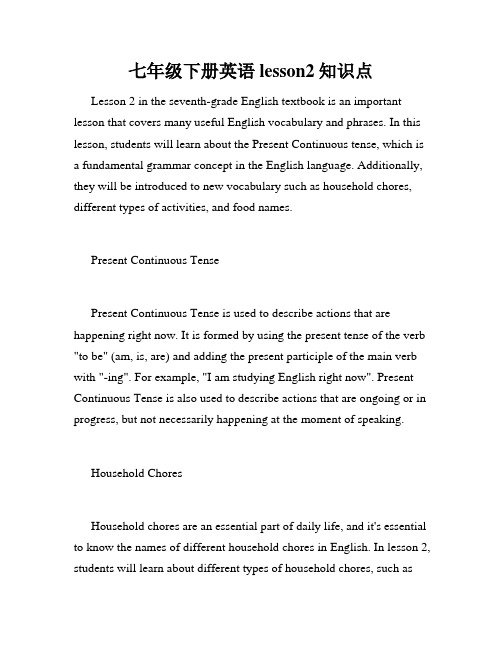
七年级下册英语lesson2知识点Lesson 2 in the seventh-grade English textbook is an important lesson that covers many useful English vocabulary and phrases. In this lesson, students will learn about the Present Continuous tense, which is a fundamental grammar concept in the English language. Additionally, they will be introduced to new vocabulary such as household chores, different types of activities, and food names.Present Continuous TensePresent Continuous Tense is used to describe actions that are happening right now. It is formed by using the present tense of the verb "to be" (am, is, are) and adding the present participle of the main verb with "-ing". For example, "I am studying English right now". Present Continuous Tense is also used to describe actions that are ongoing or in progress, but not necessarily happening at the moment of speaking.Household ChoresHousehold chores are an essential part of daily life, and it's essential to know the names of different household chores in English. In lesson 2, students will learn about different types of household chores, such assweeping, washing dishes, and doing laundry. Learning these vocabulary words can be very useful in everyday life, whether it's communicating with family members or understanding instructions on household products.Activities and HobbiesThis lesson also introduces students to various activities and hobbies. Vocabulary words such as playing football, riding a bike, and reading books can be helpful when communicating with friends or talking about favorite hobbies. It's important to note that English language learners should practice using these vocabulary words in sentences to master them fully.Food NamesKnowing the names of different types of food is essential when communicating in English. In lesson 2, students will learn about different types of food such as spaghetti, french fries, and eggs. Being able to properly order food in a restaurant, read menus, and understand food packaging labels are essential skills for English language learners.In conclusion, lesson 2 of the seventh-grade English textbook is an essential lesson that introduces students to various English vocabulary words and grammar concepts. Learning about Present Continuous Tense, household chores, activities and hobbies, and food names are all crucial skills for English language learners. By mastering these concepts and vocabulary words, students can improve their communication skills and succeed in their English language studies.。
高考英语从句知识点笔记
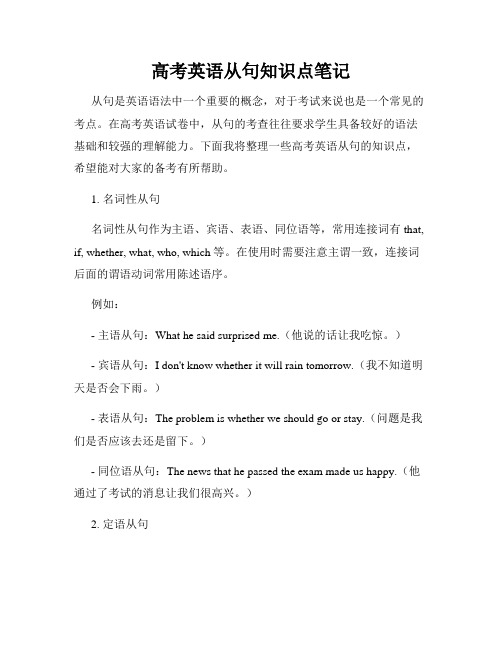
高考英语从句知识点笔记从句是英语语法中一个重要的概念,对于考试来说也是一个常见的考点。
在高考英语试卷中,从句的考查往往要求学生具备较好的语法基础和较强的理解能力。
下面我将整理一些高考英语从句的知识点,希望能对大家的备考有所帮助。
1. 名词性从句名词性从句作为主语、宾语、表语、同位语等,常用连接词有that, if, whether, what, who, which等。
在使用时需要注意主谓一致,连接词后面的谓语动词常用陈述语序。
例如:- 主语从句:What he said surprised me.(他说的话让我吃惊。
)- 宾语从句:I don't know whether it will rain tomorrow.(我不知道明天是否会下雨。
)- 表语从句:The problem is whether we should go or stay.(问题是我们是否应该去还是留下。
)- 同位语从句:The news that he passed the exam made us happy.(他通过了考试的消息让我们很高兴。
)2. 定语从句定语从句用来修饰名词或代词,常用连接词有关系代词who, whom, whose, which, that以及关系副词where, when, why等。
定语从句所修饰的名词或代词称为先行词,定语从句一般紧跟在先行词之后。
例如:- 关系代词引导的定语从句:The professor who taught us English last year is from Canada.(去年教我们英语的那位教授来自加拿大。
)- 关系副词引导的定语从句:This is the school where I studied when I was a child.(这是我小时候上学的学校。
)3. 状语从句状语从句用来修饰动词、形容词、副词等,用于表达时间、地点、原因、条件、比较、方式等,常用连接词有when, while, before, after, since, until, because, since, if, unless, though等。
普陀补习班高二英语暑假班2名词性从句复习教师学生版.docx
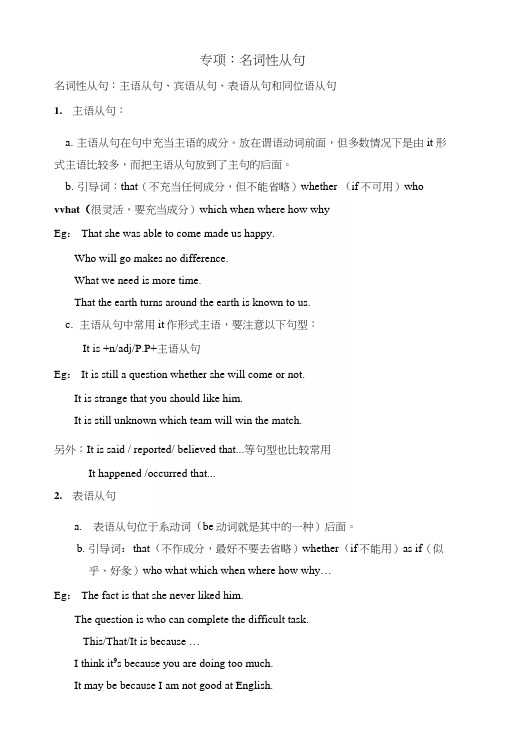
专项:名词性从句名词性从句:主语从句、宾语从句、表语从句和同位语从句1.主语从句:a.主语从句在句中充当主语的成分。
放在谓语动词前面,但多数情况下是由it 形式主语比较多,而把主语从句放到了主句的后面。
b.引导词:that(不充当任何成分,但不能省略)whether (if不可用)who vvhat(很灵活,要充当成分)which when where how whyEg: That she was able to come made us happy.Who will go makes no difference.What we need is more time.That the earth turns around the earth is known to us.c.主语从句中常用it作形式主语,要注意以下句型:It is +n/adj/P.P+主语从句Eg: It is still a question whether she will come or not.It is strange that you should like him.It is still unknown which team will win the match.另外:It is said / reported/ believed that...等句型也比较常用It happened /occurred that...2.表语从句a.表语从句位于系动词(be动词就是其中的一种)后面。
b.引导词:that(不作成分,最好不要去省略)whether(if不能用)as if(似乎、好彖)who what which when where how why…Eg: The fact is that she never liked him.The question is who can complete the difficult task.This/That/It is because …I think it9s because you are doing too much.It may be because I am not good at English.The reason + 定语从句••• is that...The reason why he can be successful is that he worked hard.3.宾语从句a.宾语从句在句中作及物动词或介词的宾语。
七下英语二单元知识点
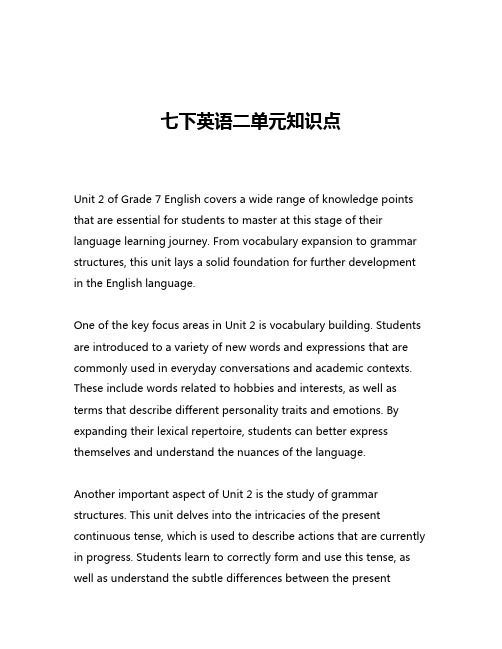
七下英语二单元知识点Unit 2 of Grade 7 English covers a wide range of knowledge points that are essential for students to master at this stage of their language learning journey. From vocabulary expansion to grammar structures, this unit lays a solid foundation for further development in the English language.One of the key focus areas in Unit 2 is vocabulary building. Students are introduced to a variety of new words and expressions that are commonly used in everyday conversations and academic contexts. These include words related to hobbies and interests, as well as terms that describe different personality traits and emotions. By expanding their lexical repertoire, students can better express themselves and understand the nuances of the language.Another important aspect of Unit 2 is the study of grammar structures. This unit delves into the intricacies of the present continuous tense, which is used to describe actions that are currently in progress. Students learn to correctly form and use this tense, as well as understand the subtle differences between the presentcontinuous and the simple present. This knowledge is crucial for effective communication in both spoken and written English.In addition to the present continuous tense, Unit 2 also covers the concept of modals. Modals are auxiliary verbs that express different degrees of possibility, necessity, or obligation. Students explore the use of modals such as "can," "should," and "must," and learn how to apply them appropriately in various contexts. This understanding of modal usage enhances students' ability to convey their thoughts and opinions with greater precision.Unit 2 also introduces the concept of relative clauses, which are used to provide additional information about a noun or pronoun in a sentence. Students learn to identify and use relative pronouns like "who," "which," and "that" to create complex sentences that are more descriptive and informative. This skill is particularly important for academic writing, where the ability to construct well-structured and cohesive sentences is highly valued.Another key focus of Unit 2 is the development of reading comprehension skills. Students are exposed to a variety of text types, including narratives, informative articles, and dialogues. They learn strategies for understanding the main ideas, identifying key details, and drawing inferences from the given texts. This helps students become more proficient readers, which in turn supports their overalllanguage proficiency.In addition to reading comprehension, Unit 2 also emphasizes the importance of listening skills. Students engage in various listening activities, such as following instructions, identifying key information, and understanding spoken dialogues. This exposure to authentic language use helps students improve their ability to comprehend and respond to spoken English in real-life situations.Furthermore, Unit 2 encourages the development of speaking skills. Students participate in role-playing activities, group discussions, and individual presentations, which allow them to practice using the language they have learned in a more interactive and communicative setting. This hands-on experience helps students gain confidence in their ability to express themselves orally and engage in meaningful conversations.Finally, Unit 2 also touches upon the development of writing skills. Students are introduced to different types of writing, such as personal narratives, descriptive essays, and opinion pieces. They learn the basic structure and organization of these writing genres, as well as strategies for generating ideas, drafting, and revising their work. This comprehensive approach to writing instruction equips students with the necessary skills to communicate effectively in written English.In conclusion, Unit 2 of Grade 7 English is a comprehensive and multifaceted unit that covers a wide range of knowledge points. From vocabulary expansion to grammar structures, reading comprehension to listening and speaking skills, and the development of writing abilities, this unit lays a strong foundation for students to continue their English language learning journey. By mastering the content and skills covered in Unit 2, students will be better prepared to tackle more advanced language challenges and succeed in their academic and personal endeavors.。
七年级下册英语第二单元2d知识点
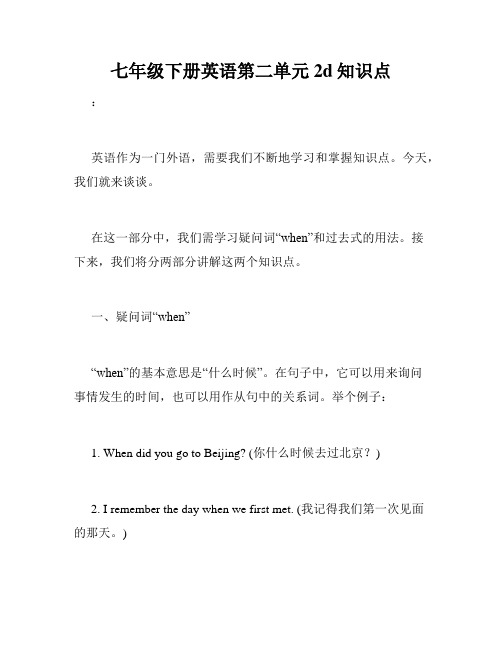
七年级下册英语第二单元2d知识点:英语作为一门外语,需要我们不断地学习和掌握知识点。
今天,我们就来谈谈。
在这一部分中,我们需学习疑问词“when”和过去式的用法。
接下来,我们将分两部分讲解这两个知识点。
一、疑问词“when”“when”的基本意思是“什么时候”。
在句子中,它可以用来询问事情发生的时间,也可以用作从句中的关系词。
举个例子:1. When did you go to Beijing? (你什么时候去过北京?)2. I remember the day when we first met. (我记得我们第一次见面的那天。
)需要注意的是,当“when”的从句作为主语、宾语、表语、宾补或同位语时,我们需用it作为形式宾语。
例如:1. It surprised me when I heard the news. (当我听到这个消息时,我很惊讶。
)二、过去式过去式是表示发生在过去的动作或状态的时态。
在英语语法中,通常可以用简单过去式、过去进行时和过去完成时来表示过去的时间。
1. 简单过去式在简单过去式中,动词加上了-ed的结尾。
例如:1. I watched TV last night. (我昨晚看了电视。
)2. She answered the question correctly. (她正确地回答了问题。
)2. 过去进行时在过去进行时中,动词用was/were + V-ing的形式。
例如:1. At this time yesterday, she was riding her bike. (昨天这个时候,她正在骑自行车。
)2. They were playing basketball when it started to rain. (下雨时,他们在打篮球。
)3. 过去完成时在过去完成时中,动词用had + V-ed的形式。
例如:1. When she arrived home, she found that her parents had already gone out. (当她回家时,发现父母已经出去了。
初中英语语法-英语从句总结(K12教育文档)
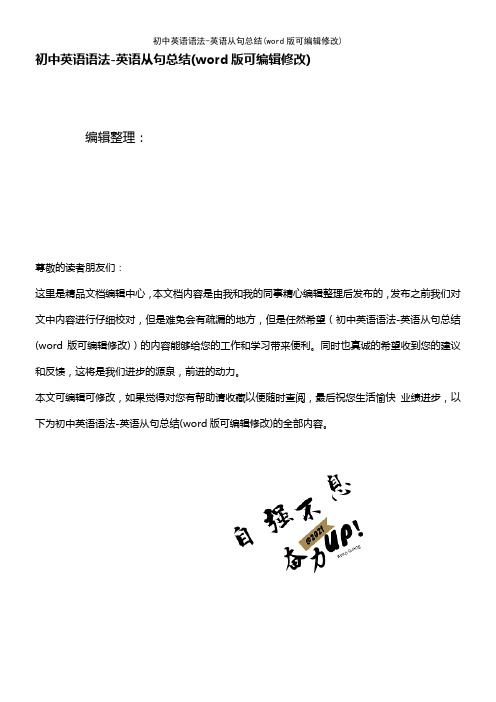
初中英语语法-英语从句总结(word版可编辑修改)编辑整理:尊敬的读者朋友们:这里是精品文档编辑中心,本文档内容是由我和我的同事精心编辑整理后发布的,发布之前我们对文中内容进行仔细校对,但是难免会有疏漏的地方,但是任然希望(初中英语语法-英语从句总结(word版可编辑修改))的内容能够给您的工作和学习带来便利。
同时也真诚的希望收到您的建议和反馈,这将是我们进步的源泉,前进的动力。
本文可编辑可修改,如果觉得对您有帮助请收藏以便随时查阅,最后祝您生活愉快业绩进步,以下为初中英语语法-英语从句总结(word版可编辑修改)的全部内容。
初中英语语法总结(从句)英语从句三大类型按一般说法,可分为三大类14种从句。
一,名词性从句1主语从句Whether it’s right or not remains to be seen.2宾语从句I wonder whether it's right or not.3同位语从句This is a question whether it’s right or not.4表语从句The question is whether it's right or not。
二,定语从句1限定性定语从句She is the student who can speak English well.2非限定性定语从句She is the student, who can speak English well。
三,状语从句1时间状语从句The fact will come out when he comes here.2地点状语从句You can go wherever you like。
3原因状语从句Pay more attention to your lessons because you area student.4方式状语从句He walks as if he were a king。
新初一暑假讲义-新概念2 lesson 2(教师版)
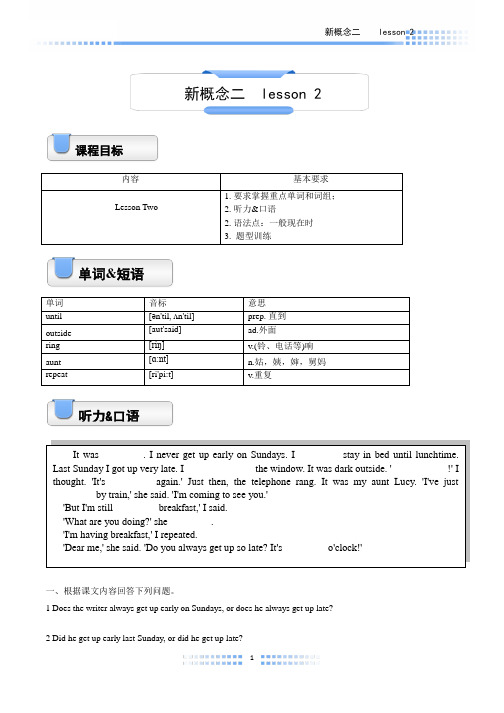
内容 基本要求Lesson Two1. 要求掌握重点单词和词组;2. 听力&口语2. 语法点:一般现在时3. 题型训练单词 音标意思 until [ən'til, ʌn'til] prep. 直到 outside [aut'said] ad.外面ring [riŋ] v.(铃、电话等)响 aunt [ɑ:nt] n.姑,姨,婶,舅妈 repeat[ri'pi:t]v.重复一、根据课文内容回答下列问题。
1 Does the writer always get up early on Sundays, or does he always get up late? _____________________________________________________________________2 Did he get up early last Sunday, or did he get up late?It was ________. I never get up early on Sundays. I ________ stay in bed until lunchtime. Last Sunday I got up very late. I _____________ the window. It was dark outside. '___________!' I thought. 'It's ________ again.' Just then, the telephone rang. It was my aunt Lucy. 'I've just ________ by train,' she said. 'I'm coming to see you.' 'But I'm still ________ breakfast,' I said. 'What are you doing?' she ________. 'I'm having breakfast,' I repeated.'Dear me,' she said. 'Do you always get up so late? It's ________ o'clock!'听力&口语单词&短语课程目标新概念二 lesson 2_____________________________________________________________________3 Who telephoned them?_____________________________________________________________________4 Had she just arrived by train, or had she come on foot?_____________________________________________________________________5 Was she coming to see him or not?_____________________________________________________________________6 Did he say, ‘I’m still having breakfast’, or did he say, ‘I am still in bed’?_____________________________________________________________________7 Was his aunt very surprised or not?_____________________________________________________________________8 What was the time?_____________________________________________________________________二、根据答案,对本文章进行口头转述。
- 1、下载文档前请自行甄别文档内容的完整性,平台不提供额外的编辑、内容补充、找答案等附加服务。
- 2、"仅部分预览"的文档,不可在线预览部分如存在完整性等问题,可反馈申请退款(可完整预览的文档不适用该条件!)。
- 3、如文档侵犯您的权益,请联系客服反馈,我们会尽快为您处理(人工客服工作时间:9:00-18:30)。
2015年暑期补习知识点2 -- 从句从句,在我们所学的按句子结构分类的三种句子中只存在于复合句中。
一、回忆什么是复合句复合句(亦叫主从复合句)是由一个主句和一个或者一个以上的从句构成的句子。
复合句中的主句和从句都具有完整的主谓结构。
主句是复合句的主体,可以独立存在。
从句需要有一个连词引导与主句连接在一起,是修饰说明主句的,不能独立存在。
根据在句中不同的作用,从句可以分为三大类:名词性从句(主语从句,表语从句,宾语从句和同位语从句)、形容词性从句(定语从句)和副词性从句(状语从句)。
从句名词性从句主语从句表语从句宾语从句同位语从句形容词性从句定语从句限制性定语从句、非限制性定语从句。
副词性从句状语从句时间状语从句、地点状语从句、原因状语从句、目的状语从句、方式状语从句、条件状语从句、结果状语从句、让步状语从句、比较状语从句等。
二、名词性从句1)主语从句:一个从句在复合句中充当主句的主语,通常放于主句谓语动词之前。
可以引导主语从句的关联词有:that, whether, what, which, whom, whose, when, where, why, how, whatever, whoever...That he will succeed is certain.Whether she will go there is not known.What he said is not true.Who broke the window has not been found out.How he escaped is still a mystery.That Mr. Brown can’t attend our English meeting is a pity.深化点拨:(1)that引导主语从句时,无实际意义,不作句子成分,但不能省略。
(2)主语从句中,为保持句子的平衡,避免头重脚轻,我们常用it作形式主语代替主语从句,而把真正的主语至于句尾。
It is a pity that Mr. Brown can’t attend our English meeting.2)宾语从句:一个句子在复合句中充当主句的宾语。
通常放在主句谓语动词(及物动词)形容词或介词之后。
类型有:that 引导的宾语从句;if /whether引导的宾语从句;疑问词引导的宾语从句I really feel that he needs more practice.The old lady likes saying that she has a good son.I want to know if she still lives here.This depends on whether he is interested in English.I am not interested in what he is doing.I don’t know why he didn’t come.He asked whose handwriting is the best.深化点拨:(1)宾语从句中,为保持句子的平衡,避免头重脚轻,我们也常用it代替宾语从句,而把真正的宾语句至于句尾。
We all find it important that we should make a quick decision about this matter. 句子有错误?3)表语从句:一个句子在复合句中充当主句的表语,表语从句常位于连系动词之后,一般结构是“主语+系动词+表语从句”。
引导表语从句的关联词有that, whether, as…if…, what, which, whom, whose, when, where, why, how...The question is that he is also short of money.That is what I want to tell you.The problem is whether he will agree to the suggestion or not.That is why he was late for school.It looked as if it is going to rain.4)同位语从句:一个句子在复合句中充当主句中某一名词的同位语,通常位于该名词之后。
这类名词通常为抽象名词,同位语从句是用来对其进行解释说明。
常用that引导,跟在news, fact, hope, idea, promise, suggestion,information,opinion, decision,discovery,truth, statement等后面构成“The fact that…+句子的”结构。
The fact that he won the first prize can’t be true.Have you heard the news that Mary will get married soon?The suggestion that the plan should be delayed will be discussed tomorrow.5)练习:判断下列各句中从句的类型1、That’s why she wanted to cry.2、I have no idea what county he is from.3、Where we shall do the test is still under discussion.4、We are very excited at the news that our Chinese athletes won many god medals.5、Whoever breaks this law deserves a fine.6、The reason for his absence was that he was ill in hospital.7、I know that he is friendly and hospitable.8、Do you know when we shall have a meeting?三、形容词性从句 -- 定语从句定语从句:一个句子在复合句中充当定语修饰主句中的某一名词或代词,该名词或代词叫做先行词。
The man who wrote the book is an English professor.I liked read the book that you read last month.She is the female teacher on the train that arrived a few minutes ago.四、副词性从句 -- 状语从句状语从句:由连词引导,在句中不担当成分,只起到连接的作用.根据意义上的不同,状语从句可分为下列几种:时间状语从句、地点状语从句、原因状语从句、目的状语从句、方式状语从句、条件状语从句、结果状语从句、让步状语从句、比较状语从句等。
时间状语I was walking when she called me.While mother was cooking, I was watching TV.She had worked in Shanghai before she came here.After he did his homework, he went to bed.I have lived here since I graduated from university.地点状语Where there is no rain , farming is difficult.She follows him wherever he goes.Where there is life, there is hope.Sit wherever you like.条件状语If I had enough money, I would buy a car.I will go there so long as he invites me.If only he has a chance, he will do great things.原因状语Because he was ill, he was absent yesterday.Since she has no time , she can’t go with you.As you are busy , I won’t waste your time.方式状语Please do as I do.Just as water is to fish , so air is to man .The child talks as if he were a man.目的状语He studied hard so that he might succeed.Take your rain coat in case it rains.Be quiet in case you (should) wake the baby.结果状语She worked so hard that she became rich in a very short time. The train was so full that I could hardly turn round.The stone is so heavy that nobody could move it.让步状语The article is very important though it is very short.He failed even though he had tried his best.Whatever he says , don’t believe him.No matter who comes, he is welcome.Exercise判断下列句子的从句类型,填入恰当的关联词。
1. the English evening party will be held has not yet been announced.2.I hope you enjoy our holiday.3.I have no idea country he is from.4.This is the Shenzhou V Spaceship landed.5.I have no idea she will be back.6. I accept the gift or refuse it is none of your business.7.Energy is makes thing work.8. we need more practice is quite clear.翻译1.汤姆已经回来了这很清楚。
